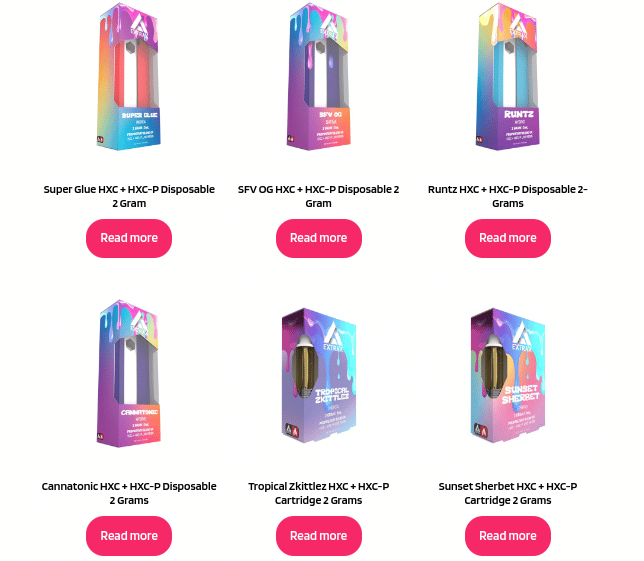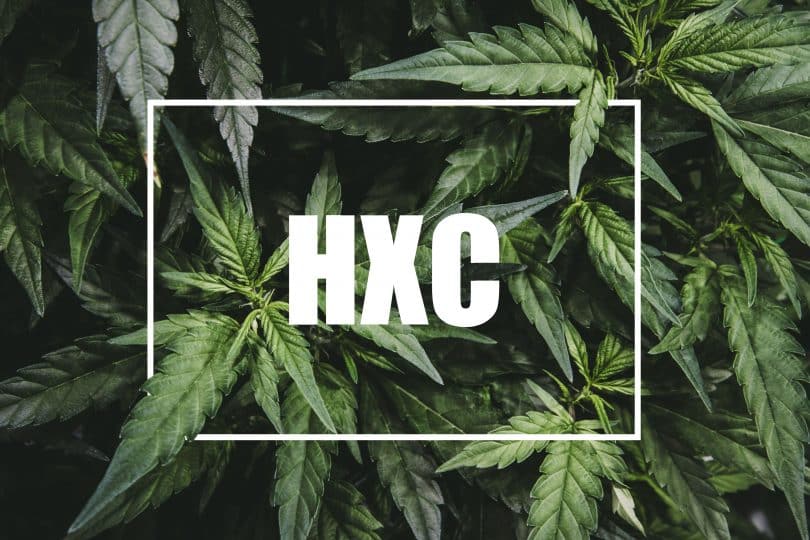Although still considered a somewhat less common alternative cannabinoid, HHC – or Hexahydrocannabinol – has been gaining popularity over the last year. To the point that it’s currently undergoing a rebrand, so to speak. Some companies have started referring to HHC, as HXC. Learn why the switch to HXC is happening.
To stay current on everything important happening in the industry, subscribe to The Cannadelics Weekly Newsletter. Also, it’ll get you premium access to deals on cannabis flowers, vapes, edibles, and much more! We’ve also got standout offers on cannabinoids, like HHC-O, Delta 8, Delta 9 THC, Delta-10 THC, THCO, THCV, THCP & HHC, which won’t kill your bank account. Head over to our “Best-of” lists to get these deals, and remember to enjoy responsibly!
What is Hexahydrocannabinol (HHC/HXC)?
All abbreviations aside, let’s focus on the basics here: what are hexahydrocannabinols? In short, they are another group of psychoactive cannabinoids that are very similar to tetrahydrocannabinols. HHC is basically a simplified version of Delta 9 THC. Both HHC, Delta-8 and Delta-9 THC have very similar molecular structures and comparable effects. With HHC, all the double bonds have been broken and replaced with hydrogen (AKA hydrogenation). It was discovered during research in the 1960s and 70s in which the goal was to find the most basic cannabinoid-like substances that could still bind to CB receptors.
There is a biologically active naturally occurring (−)-hexahydrocannabinol, as well as its synthetic enantiomer (+)-hexahydrocannabinol. The synthetic HHC, which can be found in spice, has the chemical formula: 9-Nor-9β-hydroxyhexahydrocannabinol, and the natural variety, found in trace amounts in cannabis pollen, goes by the formula: 6aR,9R,10aR-Hexahydrocannabinol.
In addition to the natural and synthetic HHCs, a couple of more potent analogues and isomers that have been created, as well as new discussion regarding the possibility of more chain lengths and combinations like HHCV, HHCB, HHCH and so on. These are the same chain length variations we see in all the different THCs.
Now, keep in mind that these are all synthetic cannabinoids – but in cannabis, the definition of “synthetic” can mean one of two things. First, synthetic cannabinoids are compounds that do not exist in nature and must be created in a lab, like THC-O. Also, a synthetic can be a cannabinoid that does exist in nature, but in such minimal amounts that in order to manufacture enough for it to be used in consumer products, it must still be synthesized in a lab, like Delta 8 THC. HHC-O falls into the first category, while HHC belongs to the second. In cannabis plants, HHC is found in trace amounts in the pollen. Then we have HHC-O, which is the acetate version of HHC, and HHC-P which is the carbon version.
We’re seeing a small influx of new, HHC-P products, hitting the store shelves, but it’s close to impossible to find any information about this cannabinoid that comes from a neutral, fact-based party rather than from the companies who are selling it. It’s likely because, the companies selling the compounds are also the ones who are creating them in the first place, and no one else really knows about these compounds or has had the opportunity to study them yet.
What’s in a name? HXC vs HHC
Just to make It perfectly clear, HXC and HHC are the same thing. Simply put, HHC is undergoing a rebrand, with a few select companies now selling HXC, HXC-O, and HXC- P… instead of HHC, HHC-O, and HHC-P. It’s hard to tell how many companies will begin doing this, but because a couple of the bigger industry brands like Delta Extrax and Cake are doing it, it’s likely to catch on.
According to our friends over at Delta Extrax, “As cannabinoids gain popularity, so does the misinformation about them. You can look at this slight change in abbreviation as an upgrade and those who don’t adapt get left behind. Another big reason why the name upgrade occurred is that HXC is the abbreviated word for Hexahydrocannabinol (HHC).”
It’s a simply but straightforward reason. I personally cannot think of any other cannabinoids getting a new name or rebranding, as there is usually some scientific basis to their names and acronyms. But it’s possible that we may see more of this in the future, and perhaps this is signaling a time when consumer products start to veer away from their chemical descriptions and start using more marketable names.

Subscribe to the THC WEEKLY newsletter!
HHC/HXC and drug testing
When it comes to cannabis, standard urine tests are used to detect use ranging from roughly 1 to 45 days. Occasional users will typically be clean after 1-5 days, regular light users will take about 1-3 weeks, and for heavy daily users, expect 4 to 6 weeks to get clean. Contrary to popular belief, standard urine tests don’t screen for the THC (tetrahydrocannabinol) in cannabis, but rather, they detect the metabolites created by the human body when we are exposed to THC.
This class of metabolites is known as THC-COOH. These metabolites are inactive, so drug testing only measures exposure, NOT impairment.THC-COOH, or “carboxy THC” is the most common name for this metabolite. It’s the second THC-metabolite formed in our bodies, following hydroxy-THC, immediately after exposure. THC-COOH is lipid-soluble, meaning it’s stored in our fat cells making it detectable in our systems for much longer than other substances, those that are water soluble for example.
One of the more interesting and appealing attributes about HHC/HXC, is that it is believed to not show up on a drug test, because it does not trigger the same metabolites in the body as tetrahydrocannabinols. Now, this is where things get a bit sketchy… it’s quite difficult to find products that are pure HHC/HXC. Even when advertised as such, many of these products contain trace amounts of Delta 8, Delta 9, and other THCs, in which case, the user would fail their drug test. To be safe, all cannabis products should be avoided if you have an important drug test coming up.
Companies that have switched to HXC – and what consumers are saying about it
So far, I’ve only discovered two major companies and one smaller brand that are selling HHC products as HXC. The two household names are Cake and Delta Extrax, and the lesser known company is Medusa Delta 8 – all of which are selling some HXC vape devices.
Examples of some HXC products you can find at Delta Extrax: SFV OG HXC + HXC-P 2 Gram Disposable, Space Candy HXC + HXC-P 2 Gram Cartridge, and Tropical Zkittlez HXC + HXC-P 2 Gram Cartridge. At cake, you can check out HXC disposables in a variety of different strains and flavors including: Animal Cookies, Banana Runtz, Blue Dream, Kush Mints, Pineapple Express, Gelato 41, Dragonfruit Rosin, and many more.
The Delta Extrax products are new, so reviews aren’t out yet, but the Cake HXC products have been around for a few months, and the reviews are mixed. As with most alternative cannabinoid products, some people love them and some don’t. Some say they have little effect, while others believe they’re stronger than THC. Case in point, everyone has different body chemistry and tolerances, and may react differently to the same compound or product.
Conclusion
Once again, HXC and HHC are the same thing. HXC is the new name/acronym given to hexahydrocannabinol by a small number of companies who sell alternative cannabinoid products. Whether you’re looking for products or information on HXC, your best bet is to check back here or subscribe to our weekly newsletter for all the latest industry updates.
Welcome all! Thanks for dropping by Cannadelics.com, a top offering for comprehensive news covering the burgeoning cannabis and psychedelics industries. Stop by daily for a dose of news on these dynamically changing fields, and sign up for The Cannadelics Weekly Newsletter, so you’re up on everything important going on.









